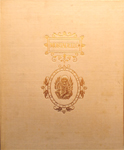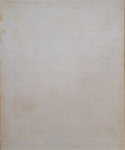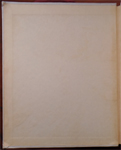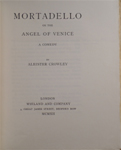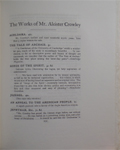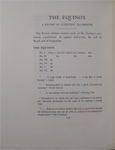100th
MP

|
THE
100th
MONKEY
PRESS |
|
|
|
Limited Editions by Aleister Crowley & Victor B. Neuburg |
|
Bibliographies |
|
Download Texts
»
Aleister
Crowley
WANTED !!NEW!!
|
|
MORTADELLO |
|
Image Thumbnails |
||||||||||||||||||||||||||||||||||||
|
Title: |
Mortadello or The Angel of Venice. A Comedy. |
|
||||||||||||||||||||||||||||||||||
|
Variations: |
|
|||||||||||||||||||||||||||||||||||
|
Publisher: |
||||||||||||||||||||||||||||||||||||
|
Printer: |
|
|||||||||||||||||||||||||||||||||||
|
Published At: |
London.4 |
|||||||||||||||||||||||||||||||||||
|
Date: |
12 June 1912.4 |
|||||||||||||||||||||||||||||||||||
|
Edition: |
First edition. |
|||||||||||||||||||||||||||||||||||
|
Pages: |
xvi + 122 for States (a) and (b) but with an addition of an extra title page.1 xvi + 122 for State (c).2 xvi + 110 for State (d).1 |
|||||||||||||||||||||||||||||||||||
|
Price: |
Priced at 10 shillings.5 |
|||||||||||||||||||||||||||||||||||
|
Remarks: |
Act I dedicated to Kaby Mohammed. Act II dedicated to Eleanore de Carme-Filleul. Act III dedicated to Victor Benjamin Neuburg. Act IV dedicated to Mary d'Este. Act V dedicated to Ida Nelidoff. |
|||||||||||||||||||||||||||||||||||
|
Pagination: |
|
|||||||||||||||||||||||||||||||||||
|
Pagination: With an additional title page of ‘Barabbas and Company’ bound in. |
|
|||||||||||||||||||||||||||||||||||
|
Pagination: |
|
|||||||||||||||||||||||||||||||||||
|
Pagination:
|
|
|||||||||||||||||||||||||||||||||||
|
Contents: |
- Preface - Mortadello - A note on the Alexandrine |
|||||||||||||||||||||||||||||||||||
|
Author’s Working Versions: |
|
|||||||||||||||||||||||||||||||||||
|
Other Known Editions: |
||||||||||||||||||||||||||||||||||||
|
Bibliographic Sources: |
|
|||||||||||||||||||||||||||||||||||
|
Comments by Aleister Crowley: |
Later in the summer, I set to work on a really large idea, a play of Old Venice in five acts. I kept my two main principles of composition; the use of colour and form to distinguish my characters and compose a visible symphony. MORTADELLO The Doge has white hair, and is seventy years of age. Mortadello has hair died dark auburn, and forty years of age. He is stout, tall and pompous. Alessandro has rough hair of fiery red and is thirty years of age. Lorenzo has scanty ashen hair, and is twenty-eight years of age. Gabriele is a hunchbacked dwarf, very strongly built, with a large and intellectual head. He is bald, and is fifty years of age. Orlando is of a gigantic stature, a full Negro. He is forty years of age. The Legate is an old and venerable man of ascetic and noble type. Magdalena is a tall, robust and buxom woman of thirty-five years old. Her hair is black, but her complexion pale. Lucrezia is a tall, robust and buxom woman of thirty-five years old. Her hair is of fine gold, her eyes of pale blue and her complexion fair and rosy. Zelina is small and plump. her hair is brown, and her age nine and twenty, though she looks older. Monica is of medium height, very thin and serpent-like, her hair black and crisp; her features like Madonna’s. Her eyes are extraordinarily black, keen and piercing. Her age is twenty. Her hands and feet are very small and white, her complexion like fine porcelain. The Abbess is a gigantic and burly woman of fifty years old. — The Confessions of Aleister Crowley. New York, NY. Hill and Wang, 1969. Pages 669-670. |
|||||||||||||||||||||||||||||||||||
|
Reviews: |
“Mortadello” is Mr. Crowley’s thirty-third book (not counting his “Collected Works,” in three volumes). and yet it is an amazingly juvenile performance. I gather, from the fatuously facetious “Preface,” that the author, himself, regards the thing as a mere lark but, at its giddiest, it is a dull, stupid, dreary affair. The stale situations, the childish “comedy,” and the puerile grossness, are incredibly school-boyish; though the verse in which the play is written is damnably accomplished. Mr. Crowley manipulates his medium with a deadly dexterity. He works the Alexandrine for all it is worth; and gets unexpected amusement out of it by the skilful surprise of unexpected internal rhymes. He is a master of metrical artifice. Possibly, I may be taking a hoax to seriously; but it seems to me a thousand pities that so much talent should be wasted on such wormy material, when the fresh stuff of poetry is ever ready to the poet’s hand. So few poems have been written as yet; there are so many to be written; and men were never more in need of the poet’s interpretation of the world about them than at the present day: so much passion, so much wonder, so much humour, are waiting for expression: and here is Mr. Crowley with boyish glee rehashing stale tales of fornicators and strumpets in ancient Venice! He is a clever cook; but we are sick of such concoctions. The would-be-dog-of-a-bard is the dullest of bores; and smutty stories, tricked out in fancy dress for the furtive delectation of hobbledehoys, are the cheapest and nastiest kind of entertainment. Mr. Crowley certainly carries the thing off with a swagger: but the man who plays the fool with his instrument must always pay the penalty; and this work should damage the author’s reputation in the minds of grown men. But before I shut the book, I must, in fairness to Mr. Crowley, quote something of his own apology which he prints in his witless “Preface”: and so give the author the last word. He writes: “This comedy is perhaps my first serious attempt at a work of art; previous lucubrations of mine having been either works of necessity or of piety: that is, or I felt obliged to tell the truth about something, or I was definitely inspired. “But the Angel of Venice (I protest) is a very cunning concoction. I have been revolving certain expositions by M. Henri Davray of Verlaine’s skill in treating the Alexandrine; and I couldn’t let it stay there! Hence the form. I had also been meditating on Maeterlinck’s method of obtaining atmosphere: but this went awry. “With regard to the matter of my proposed masterpiece, my mind was perfectly clear. “It must look like a Monticelli; it must smell like a Musc ambré; it must feel like July and August of 1911 in Paris; and above all it must taste like the Truffes au Champagne of the Cafe Riche. How it sounded didn’t matter so much. . . . “Enough of this disastrous affair. The play is ruined; if I offer it to the public, it is that they may learn the great moral lesson., not to mix their drinks.” —Rhythm, W.W.G., October 1912. ______________________________
First of all to consider Mr. Crowley, an amazing creature. He refuses to be taken seriously. His bloodthirsty, lecherous play he calls a comedy. It is a riotous farce. Intoxication—of blood, of words, of hysteria, of lust—takes the place of imagination. The play is exciting, but most amusing in its invective:
Thou puny, puking patch, White-livered, yellow-bellied wittol!
There are at least a hundred lines like that, and au fond, they are the most serious in the play, because the most sincere. At the beginning of the second act there is a couplet for which I am very grateful. It is one which all good critics—all writers indeed—should take to heart:
Now then to sound the core of the apple of our plot, Sweet as it was before, there’s such a thing as rot.
There is; and there has never yet lived a man incapable of writing it, not even Shakespeare's self, or Goethe, or Shelley. The truth is, I think, that only very little of any man’s work can rank as positive achievement, and it is the business of the critic to sift that little from the “rot.” There is not a critic with health or leisure enough to perform that office for Mr. Crowley. He has talent, scores of talents, but, seemingly, no power to use, discipline, or develop them. It would be splendid to take him seriously, but then—one cannot. He has abundant humour—a most necessary ingredient in a poet’s composition—but that, too, is untamed. —the Poetry Review, Gilbert Cannan, September 1912. ______________________________
“Mortadello; or, The Angel of Venice,” a Comedy, by Aleister Crowley. In our perusal of this new volume by a gifted poet we have often been reminded of the dramas written by John Webster and Cyril Tourneur, the Elizabethan play-wrights. The scene of Mr. Crowley’s five-act tragic-comedy is, as the title denotes, laid in Venice; and the incidents pretend to be from Venetian history. The poet in this, his “first serious attempt at a work of art,” has performed his task with rare rhythmical cunning, and in such scholarly fashion that the play will give intellectually pleasure to both students and readers of these subjects. The elegant form in which the book has been produced reflects credit upon the publishers. —The Publishers' Circular, 20 July 1912. ______________________________
Mr. Crowley is an elvish and wayward mortal—if mortal he be. But is he? For our part, we refuse to be dragged into a public discussion of delicate family matters; suffice to say that his genius, be its origin celestial or infernal, is considerably to our liking; he can write angelic poetry and devilish good prose, a cloud of exotic scholarship trailing over the whole, and suffused, every now and then, by lightning-like gleams of mirth and snappiness. Quite a phenomenon, too, in the way of common sense, when the fit is on him. But Mortadello was spoilt, for all that. No wonder. The brandies as the Café Riche are responsible for more than one disaster. And then—why, why those Truffles? That was tempting papa Beelzebub. As to the good Sir Palamede, it makes the heart bleed to reflect that he might have learnt more in three minutes’ conversation with Mr. Crowley than in all those wonderings.
“To buss the wenches, pass the pot, Is now the enviable lot Of Palamede the Saracen!”
There you are! The intellectual life in a nutshell. And only think of all the pairs of sandals the old enthusiast wore out ere attaining that blissful state. So do many of us, more’s the pity. —The English Review, August 1912. ______________________________
“Mortadello” is a drama of old Venice. It displays a similar fearlessness of treatment. The theme is bitterly cynical, yet there prevails against the cynicism a just appreciation of poetic values. Mr. Crowley has not shirked the ugliness of his theme. He had no temptation to do so. For he holds life cheap as against ideals, even the basest of which is sacred in his eyes. Let Monica be a raving wanton, so she love Venice and subserve her wantonness to that first object. The use of the Alexandrine is a pleasant innovation, and one fully justified by results. —The Literary World, date unknown. ______________________________
“Mortadello” is a much more ambitious experiment.
Dubbed a comedy, it certainly contains dramatic stuff underlying
the not very pleasant externals. It is chock-ful of incident,
but one half-suspects that Mr.
Crowley was mainly interested
in his bold experiments with
the Alexandrine. Mr. Crowley is always clever, and some
of these experiments are extraordinarily so. ______________________________
A little master piece. —The Times, date unknown. |
|||||||||||||||||||||||||||||||||||
